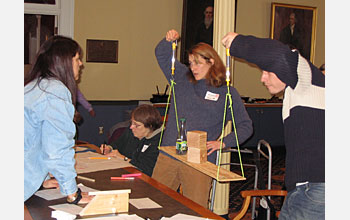Media Advisory 08-008
Finding What Works: Strategies for Improving STEM Education
Examining the evidence for program outcomes on the agenda for participants in the Math and Science Partnership program

Boston teachers from the Tufts University MSP project perform physics experiments.
January 24, 2008
This material is available primarily for archival purposes. Telephone numbers or other contact information may be out of date; please see current contact information at media contacts.
Creating a stronger bridge between students' experiences in mathematics and science education in the elementary and secondary grades, so that they participate and succeed in challenging courses in college and engage fully as contributors in America's innovative workforce, is something no educator or parent would argue with. It is also the ongoing work of the National Science Foundation's Math and Science Partnership (MSP) program, which creates alliances between university faculty in the science, technology, engineering and math (STEM) fields and K-12 teachers.
MSP projects around the country (see map at http://hub.mspnet.org/index.cfm ) have developed successful strategies for enhancing teacher development and mentoring, attracting more students to STEM courses, and improving student performance, including on state proficiency tests.
Sharing the successful practices related to teaching, learning and partnership and identifying the evidence for linking outcomes to MSP initiatives will be the overall subject of this meeting.
The meeting will be held at Hilton Washington Hotel (1919 Connecticut Ave., N.W.) in Washington, D.C., Jan. 28 and 29.
A full agenda is included below, along with a listing of topics for the break-out sessions.
Media interested in attending should contact Maria Zacharias at mzachari@nsf.gov, or 703-292-8454.
-NSF-
Media Contacts
Maria C. Zacharias, NSF, (703) 292-8070, email: mzachari@nsf.gov
Program Contacts
James E. Hamos, NSF, (703) 292-4687, email: jhamos@nsf.gov
Related Websites
2008 Math and Science Partnership (MSP) Learning Network Conference Agenda: http://www.nsf.gov/news/other_images/agenda.doc
Math and Science Partnerships Web page: http://hub.mspnet.org/index.cfm
The U.S. National Science Foundation propels the nation forward by advancing fundamental research in all fields of science and engineering. NSF supports research and people by providing facilities, instruments and funding to support their ingenuity and sustain the U.S. as a global leader in research and innovation. With a fiscal year 2023 budget of $9.5 billion, NSF funds reach all 50 states through grants to nearly 2,000 colleges, universities and institutions. Each year, NSF receives more than 40,000 competitive proposals and makes about 11,000 new awards. Those awards include support for cooperative research with industry, Arctic and Antarctic research and operations, and U.S. participation in international scientific efforts.
Connect with us online
NSF website: nsf.gov
NSF News: nsf.gov/news
For News Media: nsf.gov/news/newsroom
Statistics: nsf.gov/statistics/
Awards database: nsf.gov/awardsearch/
Follow us on social
Twitter: twitter.com/NSF
Facebook: facebook.com/US.NSF
Instagram: instagram.com/nsfgov
